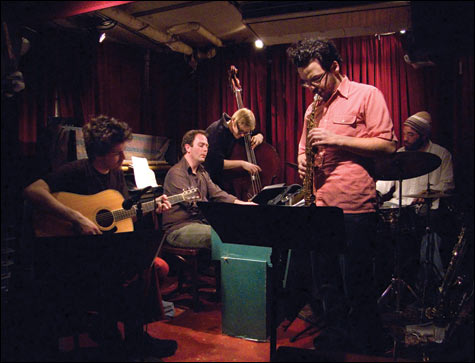
IDENTITY CRISIS: Jeremy Udden’s role models for his first album were Joe Henderson and Joe Lovano — but he was listening to Beck and Wilco. |
In his Village Voice review of Jeremy Udden’s Plainville (Fresh Sound New Talent), Jim Macnie recalled how a friend of his tried to file it as “jazz for Wilco fans.” As Macnie explained, that’s not the whole story with Udden or Plainville, but it’s not a bad starting point.
The 31-year-old Udden, who comes to the House of Blues Foundation Room on November 4, has been taking the path of a lot of younger jazz musicians these days — from Aaron Parks and Brian Blade to Julian Lage and Jim Black. That is, their influences are as much folk or rock as jazz. And instead of covering contemporary pop, they’re writing originals based on the pop they’re listening to. When Udden — a New England Conservatory master’s-program graduate and former member of Boston’s Either/Orchestra — released his solo debut, Torch Songs, in 2006, he told me that his models were classic modern jazz albums: Joe Henderson’s Lush Life (Verve) and Joe Lovano’s Rush Hour (Blue Note). They were his idea of jazz concept albums. But the records he was actually listening to were Wilco’s Yankee Hotel Foxtrot (Nonesuch) and Beck’s Sea Change (Interscope).
Torch Songs did split the difference. “Marin” amounted to a duet between Udden and one of his NEC teachers, the great trombonist and composer Bob Brookmeyer. In its time feel and its harmonies, it was as jazz as you can get. But other tunes, like “Fish Lake,” were folk-like in their chord progressions. And though “Fish Lake” included solos, Udden himself didn’t take one.
With Plainville, his immersion in pop and folk is total. The opening title tune begins with the sound of churchy pump organ and follows with a plinky-plink banjo and Udden’s plaintive alto melody before shifting into more of a trotting clip-clop rhythm. The acoustic-guitar strum of “Christmas Song” suggests a Leonard Cohen waltz. “Red Coat Lane” is another waltz, this one introduced by alto accented with a stiff-legged thump before Brandon Seabrook’s banjo takes the melody “out” over gently wheezing pump organ. And “Curbs” and “Big Licks” lift off with heavy beats and skronky electric guitar. Despite these outbursts, the mood tends toward the pastoral and elegiac. (The album is named for Udden’s home town in southern Massachusetts; it even sports a sepia-toned photo of the local general store on the cover.)
The arrangements throughout are beautifully balanced, with a natural flow in changing textures, and some brilliant improvisations — whether it’s the electric guitars of Ben Monder and Seabrook or Seabrook’s banjo and Udden’s sax. In “Big Licks,” everyone drops out as Udden builds lines in a mix of short and long phrases, climbing, diving, darting, jazz-like in feints into adjacent keys while bassist Eivind Opsvik holds the loose groove beside him, and then everyone else comes in for another rave-up.